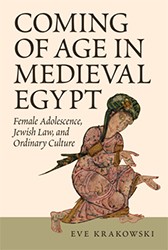“Werewolf Bar Mitzvah, spooky scary; boys becoming men, men becoming wolves.” This musical refrain from a sketch in an episode of the NBC sitcom 30 Rock is not something one expects to come across while reading an academic work about the Pietistic group of medieval Jewish thinkers centered in Germany known as the Hasidei Ashkenaz. And yet, in the scheme of the A Remembrance of His Wonders, this reference is most appropriate. The book, written by David I. Shyovitz, a teacher of history and Jewish studies in Northwestern University, presents fascinating case studies of the relationship between the aforementioned medieval Jewish scholars and their thinking about the theologies, and possibilities, of, the human body.
Seeking to combat the long-held scholarly perception that the Hasidei Ashkenaz were an ascetic, anti-rational group who denigrated the concept of the human body in favor of the spiritual soul, Shyovitz amply demonstrates that these long-held scholarly perceptions must be reexamined. Taking his readers through topics including the corporialism of God (the belief that God had a body), rabbinic explorers’ tales of one-eyed and no-headed creatures, the concept of magnetism and its resonance for religious thinkers (see the medieval suggestion that just as metals cling to each other, man can cling to God), werewolves, and even human excrement, among other diverse areas of study, Shyovitz shows how these Pietists were not against valuing nature and the human body, but rather had an expanded view of these concepts that reflected and responded to the beliefs of their time, including those of their Christian neighbors. Showing how Christian thinkers wrestled with the idea of Jesus as human, and how that informed their thinking regarding the limits of the human body and its ability to change, as well as the value of its functions and fluids, Shyovitz makes a strong case for Jewish responses to, and deep thinking about, such bodily-related issues. Whether it is recounting a claim by a Christian thinker that the supposed ability of human beings to change into werewolves (i.e. be both human and something greater) is proof for Jesus’ ability to be both human and divine, or quoting a thirteenth century Jewish biblical interpreter who, based on the biblical blessing in Genesis 49:27, “Benjamin is a ravenous wolf,” claimed that this son of the patriarch Jacob had the ability to turn into a werewolf, this volume is a fascinating study of the history of science, theology, Rabbinics, Christianity, medieval polemics, and the belief in the wondrous.
For both scholars and laypeople, the book offers a refreshingly original look into questions, texts, and beliefs that at first glance might seem esoteric, mystical, and of interest only to specialists. In reality, the book, and the thinkers discussed therein, wrestles with questions that hold deep contemporary resonance: how do we think about our bodies in relationship to the divine? How does the concept of nature relate to the idea of an all-powerful God? And how do people of faith attempt to form a religious worldview that incorporates the latest scientific discoveries? For anyone interested in these questions or, additionally, for anyone interested in finding out what other surprises an academic book that quotes Tracy Jordan from 30 Rock has in store, this book offers many wonders.
Dr. Stu Halpern is Senior Advisor to the Provost of Yeshiva University. He has edited or coedited 17 books, including Torah and Western Thought: Intellectual Portraits of Orthodoxy and Modernity and Books of the People: Revisiting Classic Works of Jewish Thought, and has lectured in synagogues, Hillels and adult Jewish educational settings across the U.S.





